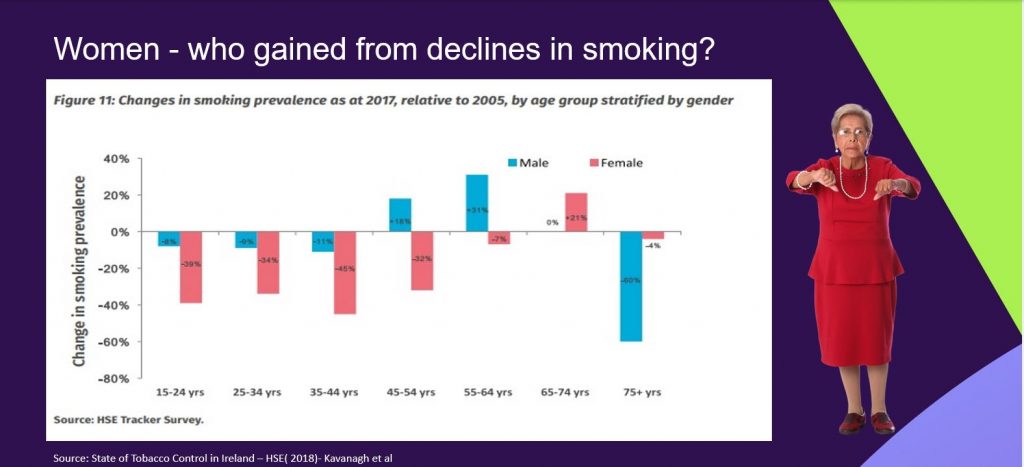
It’s National Menopause Awareness Week, Ireland’s first national awareness campaign about menopause. The campaign slogan ‘Let’s take the mystery out of menopause’ highlights the need for clear information and evidence, as well as empathy, for those facing menopause.
In this blog, Dr Helen McAvoy, Director of Policy at the Institute of Public Health, shines a light on the relationship between menopause and smoking. SPOILER ALERT – it’s a more important relationship than you might think! This blog is written in the format of advice for women who smoke but it will also be of interest to service providers supporting women to navigate menopause.
Will smoking affect when menopause begins?
Yes. It’s difficult to predict for any individual woman, but women who smoke are at increased risk of premature menopause i.e. completing menopause before the age of 40. The British Birth Cohort studies from 1958 and 1970 provided some early evidence of the effect of smoking in determining premature and earlier onset of menopause [1]. Later studies estimated that women who smoke were twice as likely as non-smokers to experience premature menopause and suggest a dose-response relationship. In other words, the more cigarettes smoked and the longer the duration of smoking, the greater the risk of earlier menopause.
Will smoking affect my menopause symptoms and experience?
Yes. Smoking puts you at increased risk of experiencing more severe menopause symptoms. The InterLACE collaboration, based on studies of more than 20,000 women aged 50, concluded that the risk of experiencing frequent or severe vasomotor symptoms (like hot flushes or night sweats) was highest for women who smoked and highest for women who smoked more than 20 cigarettes a day [2].
But why does this happen to women who smoke?
It’s all about hormones – in simple terms smoking upsets the balance of hormones that do ‘male’ jobs (like growing facial hair) and hormones that do ‘female’ jobs (like supporting the menstrual cycle). This imbalance drives an increased risk of hot flushes and more severe hot flushes. More worryingly than that, smoking also ‘amplifies’ the increased risk of diseases after menopause especially osteoporosis (weak bones), heart disease, lung disease and clots [3] [4].
Surely my diet, activity and weight are much more important to how I feel in menopause?
Diet, weight and physical activity are certainly important factors to manage in terms of your menopause and your health in general. But the evidence is clear – smoking conveys greater risk than overweight or obesity. That said, women who smoke and are also living with obesity are the highest risk group for a challenging menopause and may need additional support.
For general advice on preparing for menopause, reducing your risks and educating yourself on a range of modifiable factors visit the Department of Health’s website at www.gov.ie/en/publication/5e611-preparing-for-menopause/.
Not many women in the 40 to 60 age bracket still smoke, so why worry?
Not quite. The cohort of women currently in the perimenopausal age bracket (mid-30s to mid-50s) in Ireland have a high smoking prevalence. Around one in five women in this age group smoke.

Many within this cohort were part of a ‘boom’ in women’s smoking in previous decades when girls and women were aggressively targeted by the tobacco industry[5]. Both femininity and feminism were hijacked by slick marketing. Six years after the introduction of Virginia Slims and other brands aimed at the female market, the smoking initiation rate of 12-year-old girls had increased by 110 percent.

The above image is an example of tobacco advertising to women in the 1990s – such ads were subsequently banned, but it was too late for a generation of girls and young women who became addicted and are now facing real health harms including a challenging menopause.
Can I do anything to reduce my risk?
Yes. Evidence shows that smokers who had quit for more than 10 years had similar risk to those who never smoked in terms of the risk of early or difficult menopause.
If you do one thing to prepare for menopause or you’re in perimenopause or your periods stopped an age ago, seek support to stop smoking. It’s never too late to quit and you are stronger than you think. Don’t be disheartened if you tried lots of times before, it’s the next attempt that matters.
Talk to your healthcare provider about your smoking and ask for referral to specialist stop smoking services. It’s OK to say ‘I really need help with stopping smoking, but I am afraid about the emotional toll/gaining weight/not succeeding’.
It’s important to think about your smoking as a health problem to be addressed, not as a choice or personal failing. If you smoke, think about addressing this first in your menopause and self-care plan – whether you vape, smoke or use both products, there are a range of supports available to help you. You are twice as likely to quit smoking when you make an attempt with the right support.
Resources
Find out more about the new government menopause awareness campaign at https://www.gov.ie/en/campaigns/menopause/
On Twitter follow #TalkAboutMenopause
For help and support to quit smoking visit www.QUIT.ie (Ireland) or www.want2stop.info (Northern Ireland)
For advice on managing your risk of osteoporosis as a smoker visit https://www.irishosteoporosis.ie/
References
[1] Peycheva D, Sullivan A, Hardy R, Bryson A, Conti G, Ploubidis G. Risk Factors for Early Natural Menopause: Evidence from the 1958 and 1970 British Birth Cohorts. medRxiv. 2021 Jan 1.
[2] Anderson DJ, Chung HF, Seib CA, Dobson AJ, Kuh D, Brunner EJ, Crawford SL, Avis NE, Gold EB, Greendale GA, Mitchell ES. Obesity, smoking, and risk of vasomotor menopausal symptoms: a pooled analysis of eight cohort studies. American journal of obstetrics and gynecology. 2020 May 1;222(5):478-e1.
[3] Hollenbach KA, Barrett-Connor E, Edelstein SL, Holbrook T. Cigarette smoking and bone mineral density in older men and women. American Journal of Public Health. 1993 Sep;83(9):1265-70.
[4] Gan WQ, Man SF, Postma DS, Camp P, Sin DD. Female smokers beyond the perimenopausal period are at increased risk of chronic obstructive pulmonary disease: a systematic review and meta-analysis. Respiratory research. 2006 Dec;7(1):1-9.
[5] https://www.in.gov/health/files/Targeting_Women_Children.pdf


